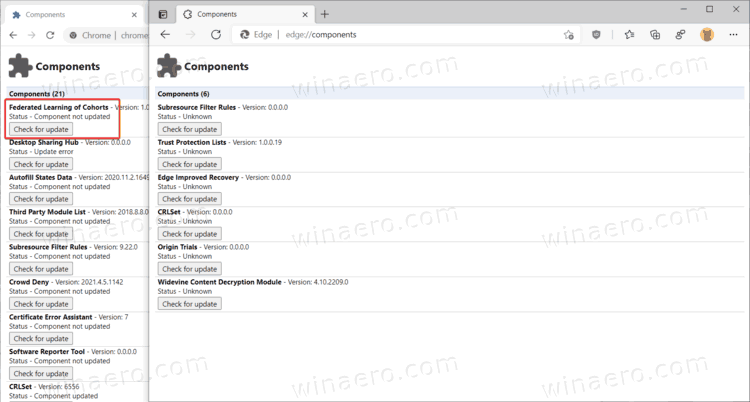More and more companies turn their backs to Google's new FLoC initiative. After Vivaldi, Duckduckgo and Brave announced their plans to fight a controversial alternative to traditional cookies, Microsoft stepped ahead and decided to disable FLoC in its Edge browser.
Advertisеment
FLoC stands for Federated Learning of Cohorts. With FLoC, Google intends to reduce tracking by putting users into groups by common interests and sharing this info with websites for ad targeting. Security experts and privacy advocates are already ringing the alarm on FLoC, claiming this feature does not benefit users' privacy. Instead, FLoC exposes data even more as it is built into the browser and shares the all the information with every website you visit, right after you open it.
Google is currently testing FLoC in the Chrome browser in a limited set of countries. Other developers that use the Chromium engine in their products can opt out and disable FLoC, which is enabled by default. Vivaldi and Brave have already said no to FLoC. Now, Microsoft follows suit.
In Edge 90, you can open edge://components and see that the browser from Microsoft is missing the FLoC component, which is present in Chrome 90.

In a statement to Bleeping Computer, Microsoft's representative says the following:
"We believe in a future where the web can provide people with privacy, transparency and control while also supporting responsible business models to create a vibrant, open and diverse ecosystem. Like Google, we support solutions that give users clear consent, and do not bypass consumer choice. That’s also why we do not support solutions that leverage non-consented user identity signals, such as fingerprinting. The industry is on a journey and there will be browser-based proposals that do not need individual user ids and ID-based proposals that are based on consent and first party relationships. We will continue to explore these approaches with the community. Recently, for example, we were pleased to introduce one possible approach, as described in our PARAKEET proposal. This proposal is not the final iteration but is an evolving document."
Currently, Microsoft wants to wait and see how Google rules out the situation with FLoC and the sudden backlash from companies and developers. Until then, Edge will stay away from the FLoC initiative.
Support us
Winaero greatly relies on your support. You can help the site keep bringing you interesting and useful content and software by using these options:
